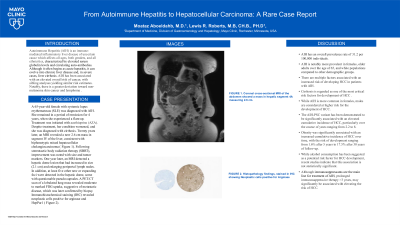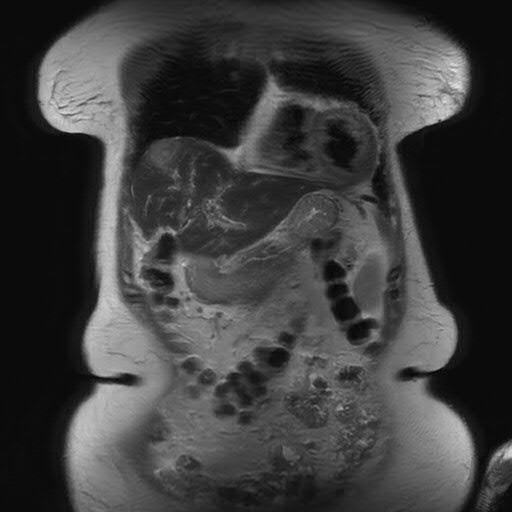Monday Poster Session
Category: Liver
P3140 - Autoimmune Hepatitis Progressing to Hepatocellular Cholangiocarcinoma: A Case Report
Monday, October 28, 2024
10:30 AM - 4:00 PM ET
Location: Exhibit Hall E

Has Audio
.jpg)
Moataz Aboeldahb, MD
Mayo Foundation for Medical Education and Research
Rochester, MN
Presenting Author(s)
Moataz Aboeldahb, MD1, Lewis R Roberts, MBChB, PhD2
1Mayo Foundation for Medical Education and Research, Rochester, MN; 2Mayo Clinic Health System, Rochester, MN
Introduction: Autoimmune hepatitis (AIH) is a chronic inflammatory liver disease, characterized by elevated serum globulin levels and circulating auto-antibodies. Although it often begins as acute hepatitis, it can evolve into chronic liver disease and, in severe cases, liver cirrhosis. Although it is rare, some observational studies found AIH to be a contributor to the development of hepatocellular carcinoma (HCC).
Case Description/Methods: In 2003, a 66-year-old female with a previous history of systemic lupus erythematosus (SLE) and Hashimoto thyroiditis presented with fatigue, migratory arthralgias, and a marked elevation of the aminotransferases with negative viral biomarkers. The patient was diagnosed with AIH. She was started on prednisone, followed by 6-mercaptopurine (6-MP) for two months, and then doses were titrated gradually. Despite the treatment, her condition worsened, and progressed to cirrhosis, a few years later. She remained in a period of remission lasting until early 2017, when she experienced a flare-up. Treatment was initiated with 1 g of immunosuppressant mycophenolate mofetil, twice a day due to previous 6-MP induced hepatic toxicity. Later, during a follow up, an MRI revealed a new 2.6 cm mass in segment IV of the liver, consistent with biphenotypic mixed hepatocellular cholangiocarcinoma. Following stereotactic body radiation therapy (SBRT),There was observed improvement in both tumor size and tumor markers. One year later, an MRI detected a 2.1 cm mass hepatic dome mass and periportal lymph nodes. In addition, at least five other new or expanding foci were detected in the hepatic dome. A PET-CT scan of a lobulated lung mass revealed moderate to marked FDG uptake, suggestive of metastatic disease, which was later confirmed by biopsy. Immunohistochemical staining (IHC) revealed neoplastic cells positive for Arginase and HepPar1.
Discussion: The incidence of HCC in patients with AIH, while considered low compared to other causes of hepatitis-induced HCC, appears to be increasing as these patients experience longer disease courses. Although the primary treatment for AIH involves immunosuppressants to maintain remission and prevent disease progression, the prolonged use of these medications raises significant concerns due to their association with various types of cancer. Despite this, there is a lack of sufficient studies exploring immunosuppressant therapy as a potential risk factor for HCC in AIH patients, highlighting the need for further research in this area.

Disclosures:
Moataz Aboeldahb, MD1, Lewis R Roberts, MBChB, PhD2. P3140 - Autoimmune Hepatitis Progressing to Hepatocellular Cholangiocarcinoma: A Case Report, ACG 2024 Annual Scientific Meeting Abstracts. Philadelphia, PA: American College of Gastroenterology.
1Mayo Foundation for Medical Education and Research, Rochester, MN; 2Mayo Clinic Health System, Rochester, MN
Introduction: Autoimmune hepatitis (AIH) is a chronic inflammatory liver disease, characterized by elevated serum globulin levels and circulating auto-antibodies. Although it often begins as acute hepatitis, it can evolve into chronic liver disease and, in severe cases, liver cirrhosis. Although it is rare, some observational studies found AIH to be a contributor to the development of hepatocellular carcinoma (HCC).
Case Description/Methods: In 2003, a 66-year-old female with a previous history of systemic lupus erythematosus (SLE) and Hashimoto thyroiditis presented with fatigue, migratory arthralgias, and a marked elevation of the aminotransferases with negative viral biomarkers. The patient was diagnosed with AIH. She was started on prednisone, followed by 6-mercaptopurine (6-MP) for two months, and then doses were titrated gradually. Despite the treatment, her condition worsened, and progressed to cirrhosis, a few years later. She remained in a period of remission lasting until early 2017, when she experienced a flare-up. Treatment was initiated with 1 g of immunosuppressant mycophenolate mofetil, twice a day due to previous 6-MP induced hepatic toxicity. Later, during a follow up, an MRI revealed a new 2.6 cm mass in segment IV of the liver, consistent with biphenotypic mixed hepatocellular cholangiocarcinoma. Following stereotactic body radiation therapy (SBRT),There was observed improvement in both tumor size and tumor markers. One year later, an MRI detected a 2.1 cm mass hepatic dome mass and periportal lymph nodes. In addition, at least five other new or expanding foci were detected in the hepatic dome. A PET-CT scan of a lobulated lung mass revealed moderate to marked FDG uptake, suggestive of metastatic disease, which was later confirmed by biopsy. Immunohistochemical staining (IHC) revealed neoplastic cells positive for Arginase and HepPar1.
Discussion: The incidence of HCC in patients with AIH, while considered low compared to other causes of hepatitis-induced HCC, appears to be increasing as these patients experience longer disease courses. Although the primary treatment for AIH involves immunosuppressants to maintain remission and prevent disease progression, the prolonged use of these medications raises significant concerns due to their association with various types of cancer. Despite this, there is a lack of sufficient studies exploring immunosuppressant therapy as a potential risk factor for HCC in AIH patients, highlighting the need for further research in this area.

Figure: MRI showing a hepatic mass in segment IV
Disclosures:
Moataz Aboeldahb indicated no relevant financial relationships.
Lewis R Roberts indicated no relevant financial relationships.
Moataz Aboeldahb, MD1, Lewis R Roberts, MBChB, PhD2. P3140 - Autoimmune Hepatitis Progressing to Hepatocellular Cholangiocarcinoma: A Case Report, ACG 2024 Annual Scientific Meeting Abstracts. Philadelphia, PA: American College of Gastroenterology.
